
The Transportation Secretary has faced staunch criticism for the past few weeks, both from members of Congress and social media users
On Sunday, U.S. Secretary of Transportation Pete Buttigieg conceded that he had a slow response to the East Palestine, Ohio, train derailment, saying that he should have gone to the city sooner.
In an exclusive interview with CNN, the former mayor of South Bend, Indiana and former presidential candidate, admitted his shortcomings, but he also denounced his critics, arguing prominent conservative politicians and figureheads could not act like they truly care about working class Americans affected by this disaster.
“It’s really rich to see some of these folks – the former president, these Fox hosts – who are literally lifelong card-carrying members of the East Coast elite, whose top economic policy priority has always been tax cuts for the wealthy, and who wouldn’t know their way around a T.J. Maxx if their life depended on it, to be presenting themselves as if they genuinely care about the forgotten middle of the country,” Buttigieg said. “You think Tucker Carlson knows the difference between a T.J. Maxx and a Kohl’s?”
The Transportation Secretary has faced staunch criticism for the past few weeks, both from members of Congress and social media users. Sen. Marco Rubio called for Buttigieg’s resignation, saying Buttigieg has “downplayed and ignored crisis after crisis, while prioritizing topics of little relevance to our nation’s transportation system.” On the Senate floor, Senate Minority Leader Mitch McConnell said that Buttigieg was “more interested in pursuing press coverage for woke initiatives and climate nonsense than in attending to basic elements of his day job.”
But much of the fallout he’s facing, Buttigieg says, is due to factors that are out of his control.
He said he recognizes he should have visited East Palestine earlier, though he added there would not have been a substantial difference in the aftermath of the derailment because it does not have much to do with the Department of Transportation. No other Transportation Secretary had ever visited a derailment site before the incident in Ohio. “Sometimes people need policy work, and sometimes people need performative work,” Buttigieg said. “And to get to this level, you’ve got to be ready to serve up both.”
Buttigieg eventually traveled to the derailment site on Feb. 23, a day after former President Donald Trump’s visit. The secretary criticized Trump, calling it “somewhat maddening” to see a figure who did so much to decrease “not just rail safety regulations, but the EPA, which is the number one thing standing between that community and a total loss of accountability,” visit.
Trump also suggested Buttigieg only visited the site because he was prompted by Trump’s visit.
Although the Environmental Protection Agency has been the leading agency dealing with the train derailment, officials say Buttigieg has been targeted because his former presidential run makes him a bigger figure that’s much easier to attack.
“Maybe they think that because he ran for president, he’s an easy target to hit,” Labor Secretary Marty Walsh told CNN.
Regardless, Buttigieg is hoping that his opponents will turn their criticism into action. “People who have sided with the rail industry again and again and again are suddenly acting like rail safety advocates,” Buttigieg told CNN. “But it also creates the chance to call them to the table and say, ‘OK, if we’re serious now, let’s do this.’”